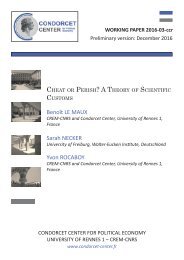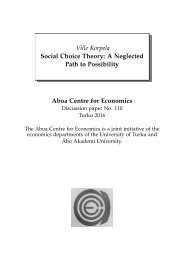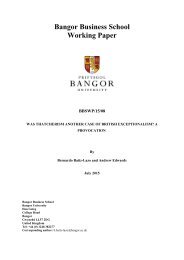MEMORANDUM
n?u=RePEc:hhs:osloec:2016_018&r=hpe
n?u=RePEc:hhs:osloec:2016_018&r=hpe
Create successful ePaper yourself
Turn your PDF publications into a flip-book with our unique Google optimized e-Paper software.
mostly civilians. 33 Needless to emphasize the World War, followed by the upheavals<br />
caused by the revolution and civil war caused enormous hardship in Russia through the<br />
ravages of war and lack of the most basic necessities, resulting in large numbers of people<br />
fleeing Russia.<br />
After the Bolshevik coup Leontief Sr. may have been in danger as a political foe but<br />
he was never arrested. In Leontief’s view this “probably because of the traditional and<br />
deep-seated respect among the Russians for academic people and particularly university<br />
professor.” 34 REF But Leontief may not fully have understood his father’s politics and the<br />
perils involved. For a shorter period in 1918 the Leontief family went into hiding in the<br />
countryside 400 km east of Petrograd. After returning to St. Petersburg the Leontief family<br />
was in 1919 evicted at 24 hours notice from their flat on Petrovskii Island in St. Petersburg<br />
by “revolutionary sailors.” 35 According to Leontief his parents never complained about<br />
their fate or expressed anger about what was going on. They retained their revolutionary<br />
view they had supported at the outset of the 1917 revolution. Leontief recalled that the<br />
parents once said to him that they used to think that they had enough money to pay for his<br />
education abroad, but “now we do not. … you must try to do it all by yourself.” The<br />
Bolshevik coup meant the end of the Leontief family’s control of the company and a severe<br />
loss of family owned assets.<br />
The Bolshevik regime made early attempts at reforming the school system and from<br />
1918 Leontief’s school became a Unit School. The teaching staff remained much the same<br />
as before the revolution with little or no inculcation of politics. But politics had become a<br />
subject of bitter divisions among the pupils who split up and fought with each other, driven<br />
by their political positions and sympathies. Curiously, Leontief had as class mates both the<br />
son of Kerensky and a daughter of Trotsky. Leontief graduated in the spring of 1921.<br />
In Leontief’s reminiscences about his early life the politics of his father is unduly<br />
subdued. Leontief regarded himself as coming from the bourgeois class and emphasized<br />
that his father, a true Russian intellectual, was in no way a defender of the old Tsarist<br />
regime. 36 In fact most intellectuals and also many others Russians were opposed to the<br />
Tsarist rule. And it was a rather backward leaning way of describing Leontief Sr. as the<br />
evidence indicates that he since very young had been politically engaged through the SRs,<br />
the Russian brand of socialism and political thought. The abolishment of the Constituent<br />
Assembly in 1917 followed by the suppression of the SR’s a couple of years later could<br />
hardly have been felt by Leontief Sr. as anything but a crushing defeat, and even more so<br />
33 See Mawdsley (2007, p.287).<br />
34 From autobiographical notes by Leontief 1954.<br />
35 Kaliadina (2006, pp. 348-9). In unpublished notes Leontief denoted the evictors as “Lenin’s<br />
sailor shock troops”.<br />
36 Rosier (1986, p.78).<br />
15





